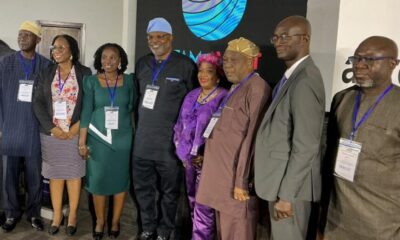Uncategorized
Infrastructure Deficit Threatening Nigeria’s Transport Future – Prof Badejo
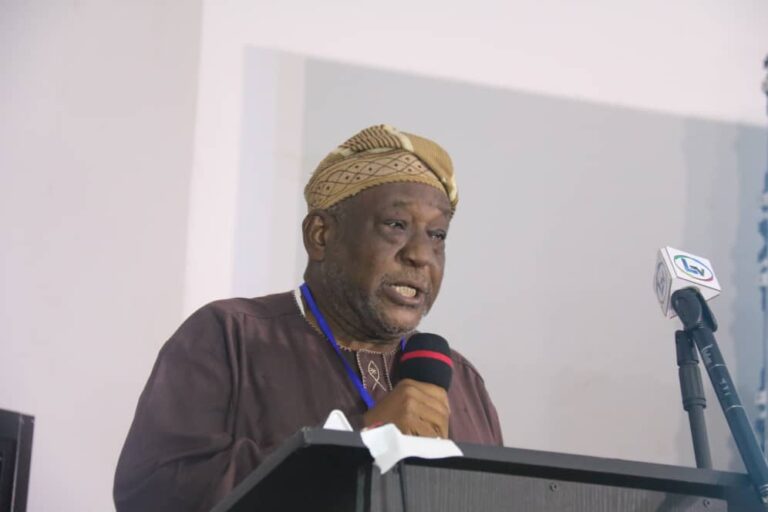
BY EGUONO ODJEGBA
Unapologetic transportant and academic, Professor Bamidele A. Badejo has said that infrastructure deficit poses a major threat to Nigeria’s transport future.
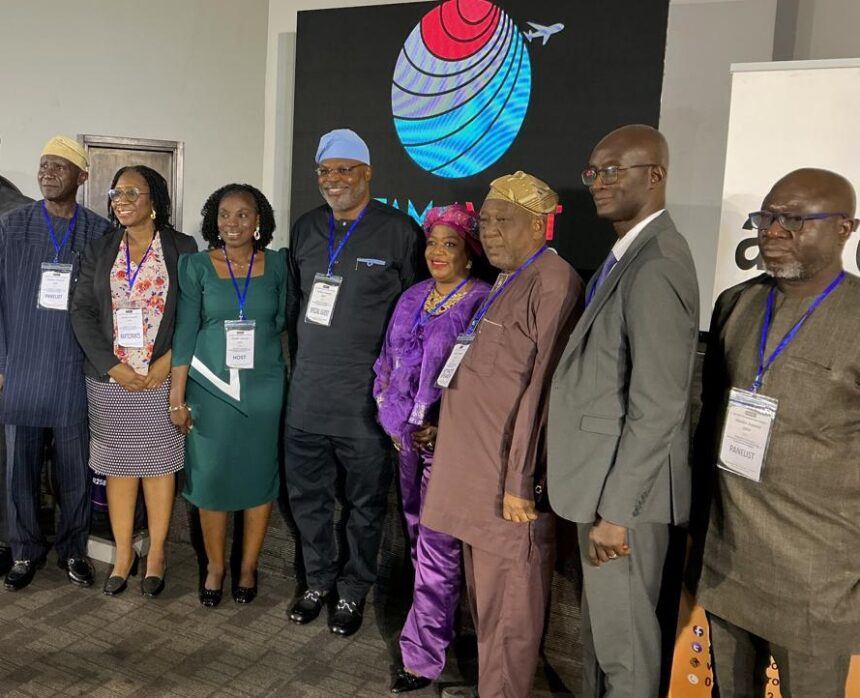
Chairman of the occassion, Mr. Tinubu (middle) with Mrs Ngwama and operators during the event
Professor Badejo, Chair of the Lagos State Government Professorial Chair, Endowment on Transport Studies at Lagos State University who was speaking at ‘Nigeria’s Transport Infrastructure: Innovation for a Sustainable Future’ 2025 Summit organized by JustNet News, held at Providence Hotel, Ikeja GRA, Lagos, noted that a growing paralysis within the operational, policy and administrative framework of transport infrastructure does not offer any hope for a sustainable, guaranteed future
The aging academic while delivering a compelling keynote address stated that ‘Transport is life and without it, everything becomes stunted”,noting that Nigeria’s vast potential—its population, geography, and natural resources, remains underutilized due to the absence of a robust, integrated transport system.
He explained that currently, over 90% of passenger and freight movement depends on road transport, much of which operates on poorly maintained networks, noting that rail, maritime, and air transport remain underdeveloped and underutilized.
“We are building on a weak foundation,” he warned, citing dilapidated roads, abandoned rail corridors, and underdeveloped inland waterways.
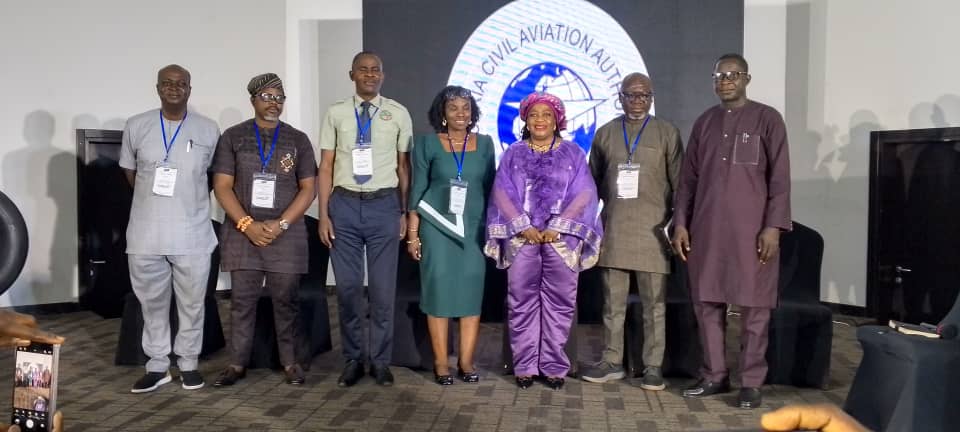
L-R: Frank Kintum, Dr. Azeez, Quadri, Mrs Ngwama, Dr. Chizoba Anyika, Dr. Femi Aiyegbajeje and Eguono Odjegba, participants at the second panel sessionduring the transport summit

Despite these challenges, Prof Badejo pointed to emerging opportunities that could transform the sector. These include digital mobility, clean energy transitions, and infrastructural expansion. He highlighted the potential for employment generation, revenue growth, and industrialization, especially through revitalized railways and waterways, port reforms, and logistics hubs.
To harness these opportunities, Prof Badejo proposed a collective blueprint for action, which includes the development of an integrated multimodal transportation framework, promotion of green mobility strategies, private sector participation, unlocking of finance through strategic partnerships, cultivation and the fostering of a culture of innovation and maintenance; among others.
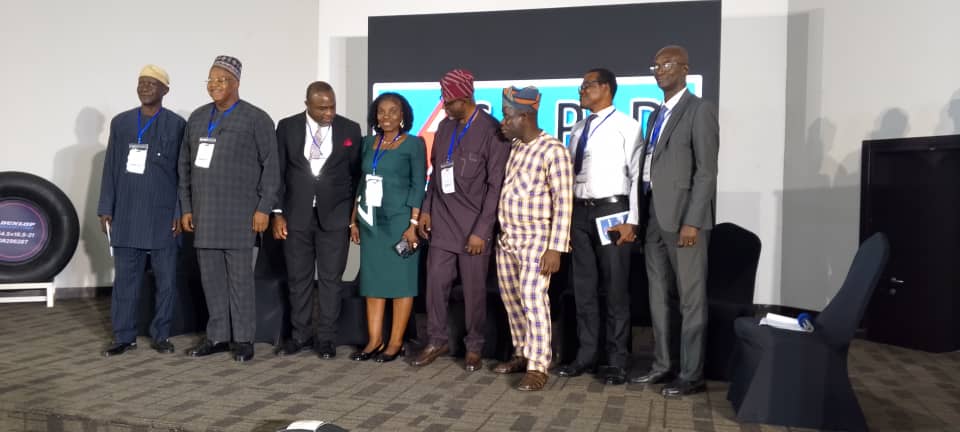
L-R: Group Captain John Ojikutu Rtd, Capt Samuel Caulcrick, Remi Jibodu, Mrs. Ngwama, Alex Nwuba, Olusegun Koiki, and Dr. Chinedu Eze, participants at the event’s second panel discussion
“Infrastructure support and logistics are sine qua non for achieving efficiency. With a well-planned strategy, Nigeria can create a transportation system that supports economic growth, improves quality of life, and enhances global competitiveness.”
Earlier in her welcome address, Mrs Pearl Ngwama, Managing Director of JustAlive Communications Limited, publisher of Just Net News, said efficient harnessing of the nation’s abundant resources and equal efficient transport connection are key to growing the economy.
Reeling out statistics to support the contribution of Nigeria’s transport infrastructure in growing the economy, Ngwama urged government and players to avoid quick fixes and engage in reliable and sustainable development frameworks.
“We only have to look around the world to see how the most advanced nations are built on formidable multimodal transport systems networks that integrate road, rail, air and sea transport seamlessly. These systems facilitate trade, improve productivity, reduce costs, and drive innovation in the economy.
“And Nigeria has the potential to replicate and even surpass that level of success. We have the minerals and the cash crops that can power industries. We have land, air and sea transport modes. Geographically, Nigeria is ideally positioned. Our country sits at the heart of the Gulf of Guinea, one of Africa’s most important maritime zones”, she said.
While operators and users turned up in their numbers, sadly, neither the ministers of transport, aviation and marine & blue economy who were duly invited nor their representatives showed up at the event; highlighting the prevailing regime of poor official responses to engagements that are critical for resetting the national compass for efficient policy restructuring in the face of failing realities to turn our economic potentials into wealth.

